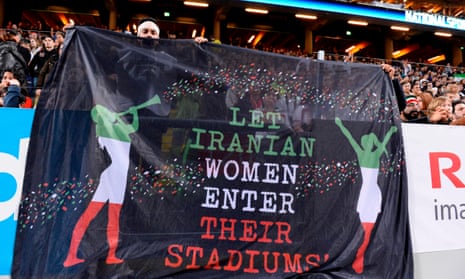The grim tragedy of Sahar Khodayari once again forces Fifa to pick the most expedient version of itself. Is it an organisation that can change the world, as it frequently insists to us, or is it simply a sporting governing body, as it prefers to claim at other times?
Sahar is Iran’s so-called “Blue Girl”, a computer sciences graduate who tried in March to enter Tehran’s Azadi stadium dressed as a man, to watch her beloved Esteghlal, but was caught by officials. She was summoned to appear in court on 2 September, and told she could expect up to six months in prison. Outside the court, Sahar set herself on fire. Last week, she died in hospital from her injuries. She was 29.
Both Esteghlal and their main rivals, Persepolis, held a minute’s silence in the wake of the news, but it is the statement her club issued that sticks in the mind for its despair. “Our dear Sahar burnt herself to death, when she was charged to 6 month in jail for … going to the stadium to support her #Esteghlal,” this read. “She supported us despite the politics made it illegal for her, but what we can do to support her? ABSOLUTELY NOTHING. We are cowards.”
The self-chastisement and misery was echoed in a statement by the Iran football captain, Masoud Shojaei, who must also be considered to speak out at some personal risk against the Iranian authorities. He called it “the most bitter and saddest win of the national team”. “We scored two goals and won the game on the field. But we lost because Sahar is no longer,” he stated. “Shame on me for not having been able to do anything and shame on those who took away the most obvious right from Sahar and all Sahars.”
Yet speaking of shamelessness and cowardice, what of Fifa, whose own rules state that discrimination on grounds of gender is punishable, either by expulsion or suspension of a federation? Needless to say its reaction has been rather more muted. Shojaei’s sister Maryam, herself an Iranian women’s rights activist, told last week’s Sunday Times that she had sent eight letters to Fifa since Sahar was charged, begging it to lift the ban. Having had no luck with those, she presented a 200,000-signature petition to Fifa officials at their Swiss headquarters. “No one took this seriously,” she reflects, explicitly.
Even now, given the emotive outpourings from Iran, Amnesty, and far beyond, Fifa’s stated course of action feels impossibly wan. “A Fifa delegation will be on site shortly to assess the preparations to allow women at the stadium for the upcoming World Cup qualifying match [Iran v Cambodia] in October,” we learn, though this was always planned. Meanwhile, the Fifa president, Gianni Infantino, has been urging the Iranian authorities to take “concrete steps” to lift the ban on Iranian women.
After this latest grotesque tragedy, however, surely the time has come for Fifa to consider some rather more “concrete steps” of its own? Iran declining to uphold their own discrimination laws should draw a ban or the serious threat of one. I’m sure they’ll make nice for the Fifa delegation – last time Infantino was in town, he watched a Persepolis game at the Azadi stadium which 1,000 women were permitted to attend in a designated “family area”. They have been banned ever since.

As for the Iranian authorities, they are totally vaguely thinking about doing something about allowing women to watch football at some point. Iranian president Hassan Rouhani’s chief of staff explained last week that the latest problem preventing this was bad language and so on. “We don’t see a problem with women attending if the atmosphere in stadiums is convenient,” he explained, “but with so much foul language among fans and violence, this is not advisable.” Only a matter of time, and all that. Or as Jafar Panahi, the prominent Iranian filmmaker behind Offside, the 2006 documentary about the issue, recalled last week, people had often said to him that his film would quickly become outdated. That was 13 years ago. Who knows, without more decisive censure from Fifa, maybe the Iranian authorities will have eliminated swearing from stadiums in 13 years? And maybe they won’t.
Again, this is one of those moments when Fifa is going to have to decide which one of two contradictory versions of itself it will cleave to. These were arguably most neatly encapsulated by Sepp Blatter. “Football has the power to build a better future,” he once declared during a 2013 speech at the Oxford Union. He went on to explain that Fifa’s job is “helping communities in need through football”. “Fifa exists … because we love the game, recognise its power and feel a strong duty to society.” Really? Because not two weeks before this, under fire for the deaths and human rights abuses of migrant workers building the Qatar World Cup infrastructure, he had espoused the diametrically opposite view: “We are not the ones that can actually change it,” Blatter explained self-effacingly. “This is not Fifa’s remit.”
Under Infantino, Fifa’s idea of its remit looks deliberately more opaque. But as we lead slowly in to a 2022 World Cup held out of season in a repressive state, at the same time as hearing evidence of ignored petitions and immolations in Qatar’s regional ally, there doesn’t seem to be a whole lot of difference between his and Blatter’s view of the organisation’s capabilities. The 2015 Fifa Spring was rather a short-lived dream of a different world, and normal disservice has since been resumed.

